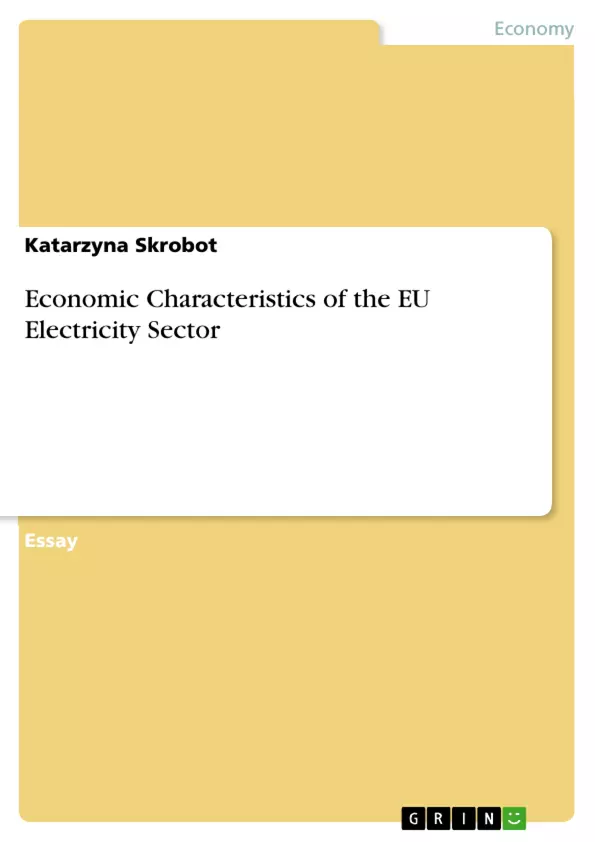In early 90´s all transition countries started with economic reforms in infrastructure services, changed the centralized organization of monopolistic infrastructure utilities and introduced marketoriented structures and public regulation. Electricity sector is specific because of its high macroeconomic significance that arises from its substantial contribution to GDP, which directly employs important amounts of capital, labor and other resources, and indirectly impacts the efficiency and competitiveness of most firms and economy as a whole through the quality and price of the electricity. Before whole reform process started, economies in EU were dealing with monopolies and natural monopolies.
Inhaltsverzeichnis (Table of Contents)
- PROLOG
- Business structure of European Union Electricity Sector
- Electricity sector in the EU is characterized:
- Lack of transparency
- Excessive concentration of the market
- Vertical integration of operators
- Problems with price setting
- Slowing down process of liberalization
- Lack of right regulation
- Independence of system operators
- What caused those problems?
- Therefore, we come out with conclusion that EU electricity sector is:
- The European Commission Role
Zielsetzung und Themenschwerpunkte (Objectives and Key Themes)
This work aims to analyze the economic characteristics of the EU electricity sector, focusing on its business structure, market liberalization process, and the role of the European Commission. It examines the challenges and issues faced during the transition from monopolistic structures to a more competitive market.
- Business structure and concentration in the EU electricity sector
- The process of market liberalization and its challenges
- Regulatory issues and the role of independent system operators
- The impact of vertical integration and market power
- The role of the European Commission in promoting competition
Zusammenfassung der Kapitel (Chapter Summaries)
The prologue introduces the context of economic reforms in the EU electricity sector, highlighting its macroeconomic significance and the shift from monopolies towards market-oriented structures. The main chapter delves into the business structure, focusing on the concentration of power among a few large players and the challenges this presents to competition and efficiency. It details the characteristics of the EU electricity sector, including lack of transparency, excessive market concentration, vertical integration, problems with price setting, a slow liberalization process, and a lack of proper regulation. The section on the causes of these problems discusses the disappearance of independent suppliers, growing awareness of market power risks, and questioning of the benefits of sector liberalization. Finally, it briefly touches upon the European Commission's role in fostering competition and establishing a fully functioning internal energy market.
Schlüsselwörter (Keywords)
EU electricity sector, market liberalization, competition, regulation, vertical integration, market concentration, European Commission, oligopoly, energy market, independent system operators, price setting.
Frequently Asked Questions
What are the main characteristics of the EU electricity sector?
The sector is characterized by high market concentration, vertical integration of operators, a lack of transparency, and ongoing challenges in the liberalization process.
Why is the electricity sector so important for the GDP?
It directly employs significant capital and labor and indirectly impacts the competitiveness of all other firms through energy prices and quality.
What is vertical integration in the energy market?
Vertical integration occurs when a single company controls multiple stages of the supply chain, such as generation, transmission, and distribution, which can limit competition.
What role does the European Commission play in the energy sector?
The Commission works to foster competition, enforce antitrust rules, and establish a fully functioning internal energy market across all member states.
What are the problems with price setting in the EU?
Issues arise from market power risks and the dominance of a few large players (oligopolies), which can prevent prices from being determined by fair competition.
What caused the slowing down of liberalization?
The disappearance of independent suppliers and growing concerns about market power have led many to question the immediate benefits of further sector liberalization.
- Arbeit zitieren
- Katarzyna Skrobot (Autor:in), 2009, Economic Characteristics of the EU Electricity Sector, München, GRIN Verlag, https://www.hausarbeiten.de/document/183573


